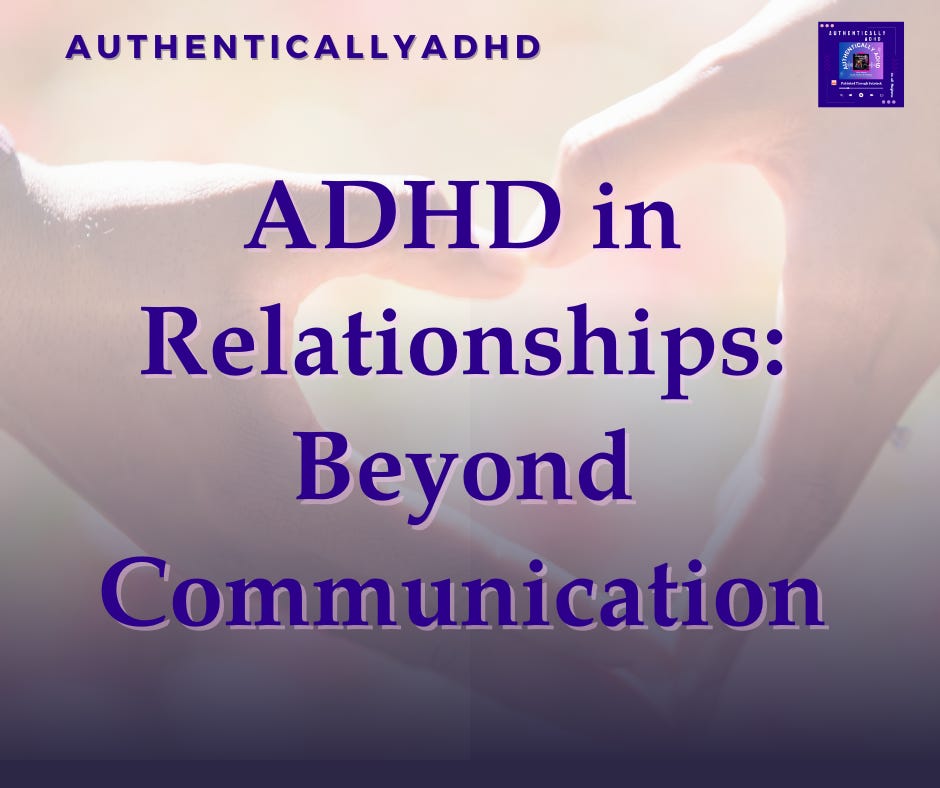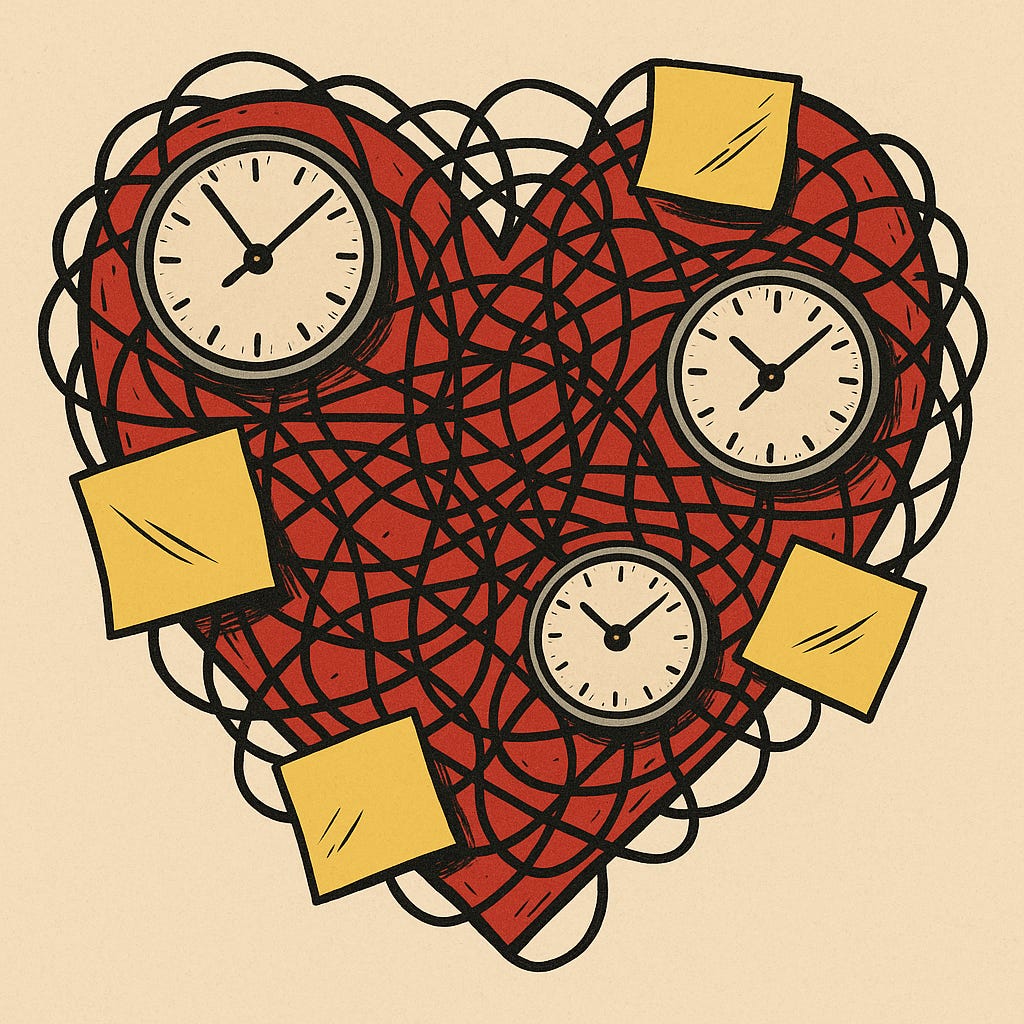ADHD in Relationships: Beyond Communication
Unpacking the Hidden Dynamics of Rejection Sensitivity, Attachment, and Intimacy
ADHD in Relationships: Beyond Communication
Communication is often hailed as the holy grail of relationship success—but for adults with ADHD, there’s a whole world of invisible dynamics playing out underneath every text left on “read,” every late arrival, and every emotional floodgate burst wide open. This blog digs deep into the neuroscience and psychology behind why ADHD brains struggle not just with what to say, but how we feel, attach, and connect. From rejection sensitivity to intimacy fears and everything in between, let’s unpack the real stuff no one talks about—and give you some tools to do something about it.
Segment 1: Rejection Sensitivity and the ADHD Nervous System
Let’s start with the emotional elephant in the room—Rejection Sensitive Dysphoria (RSD). This isn’t just being “sensitive.” It’s an intense, neurological overreaction to perceived criticism, disapproval, or abandonment. It feels like a gut punch even when no punch was thrown. Research suggests this may stem from differences in the anterior cingulate cortex and amygdala, areas involved in emotional regulation and threat detection (Barkley, 2010).
For someone with ADHD, an unanswered text can spiral into “They hate me,” in 0.3 seconds. A partner’s neutral tone might feel like deep betrayal. This hyper-vigilant emotional radar puts tremendous strain on relationships—because the partner often has no idea what just happened.
Real Talk Example:
Your partner says, “Hey, we need to talk about the dishes,” and your brain hears, “You’re a failure and I’m not happy with you.” Cue withdrawal, defensiveness, or panic.
Segment 2: ADHD and Attachment Styles: Anxious, Avoidant… or Both?
ADHD doesn’t just show up as disorganization—it messes with how we bond. People with ADHD are more likely to develop insecure attachment styles, particularly anxious-preoccupied or fearful-avoidant types (Mahoney et al., 2022). This makes relationships feel like emotional whiplash.
Why? Because ADHD often means:
Inconsistency in attention (one day hyperfocused, next day emotionally MIA)
Difficulty regulating proximity (wanting closeness, then feeling suffocated)
Memory issues that can make us forget key emotional moments—leading our partners to feel unseen or unimportant.
This isn’t about love or effort—it’s about how the ADHD brain processes social-emotional information in real-time, often through a lens of self-doubt and confusion.
Segment 3: Executive Dysfunction and the Erosion of Intimacy
Intimacy doesn’t die because of a lack of love—it dies when it gets buried under forgotten anniversaries, chronic lateness, or constant overwhelm. Executive dysfunction doesn’t just affect work—it affects how we show up for our partners emotionally and physically.
Think:
Task paralysis around planning date nights
Time blindness that leads to missed moments of connection
Emotional dysregulation that turns small conflicts into big explosions
Sexual avoidance because of sensory issues, shame, or performance anxiety
This often leaves the neurotypical partner feeling neglected or unloved—while the ADHD partner is drowning in guilt, overcompensation, and shutdown.
Segment 4: The Masking Problem: Love While Hiding
Many ADHDers—especially women and late-diagnosed adults—become chronic maskers. We try to be the “cool girl,” the reliable one, the one who never forgets. But that mask is heavy, and it creates distance. Intimacy requires vulnerability, not performance.
Here’s the kicker: masking often comes from trauma and years of unmet needs. We hide our struggles because we’ve been told we’re “too much” or “not enough.” This disconnects us not only from our partners—but from ourselves. Over time, it becomes impossible to know what real love feels like, because we’re not really being seen.
Segment 5: Strategies & Tips to Cope, Heal, and Connect
Here’s where we shift from “What’s wrong?” to “What can we do about it?”
🧠 1. Name the Neurobiology Together
Normalize that this isn’t a personality flaw—it’s brain wiring. Read up together on ADHD and emotions. Try books like "Is It You, Me, or Adult ADHD?" by Gina Pera. Talk about rejection sensitivity, time blindness, and executive function as shared language.
💬 2. Use “Story I'm Telling Myself” Language
Borrow from Brené Brown: “The story I’m telling myself is…” This creates space between what happened and how you felt it, reducing emotional reactivity and inviting clarity.
Example: “When you didn’t text back for a few hours, the story I told myself was that you were mad at me.”
🔄 3. Build Emotional Routines
Make check-ins part of your week. Not just logistics, but emotional wellness. Try:
“How connected have we felt this week?”
“What’s one thing we can do to feel closer?”
Predictable emotional routines help counter ADHD’s inherent unpredictability.
🧭 4. Externalize the Intimacy
Set calendar reminders for connection (yes, really). Shared Google calendars, sticky notes that say “Love you,” or even “Connection Tokens” (little acts that mean love—like making their coffee or folding their hoodie just right).
💡 5. Learn Conflict Recovery, Not Avoidance
ADHD brains may struggle with impulse control during a fight—but we can get better at repairing after. Use scripted repair attempts:
“That came out harsh—can I try again?”
“I’m not proud of how I handled that. I was flooded. Can we reset?”
🪞 6. Heal the Shame to Deepen the Bond
ADHDers often carry deep shame. That shame creates barriers to love and intimacy. Therapy, coaching, journaling—whatever you need to unhook from the lie that your worth depends on your perfection.
🌈 Closing Thoughts:
ADHD in relationships isn’t just about forgetting things—it’s about feeling too much, too fast, or not at all until it’s too late. But that doesn’t mean we’re doomed to chaos and conflict. With the right tools, shared understanding, and some radical self-compassion, we can build relationships that are not just functional—but deeply fulfilling.
📚 Research & Sources:
Barkley, R. A. (2010). Taking Charge of Adult ADHD
Mahoney, C. T., et al. (2022). Attachment and ADHD: A Meta-Analysis. Journal of Attention Disorders
Pera, G. (2008). Is It You, Me, or Adult A.D.D.?
Brown, B. (2012). Daring Greatly
Hallowell, E. M., & Ratey, J. J. (2011). Driven to Distraction






